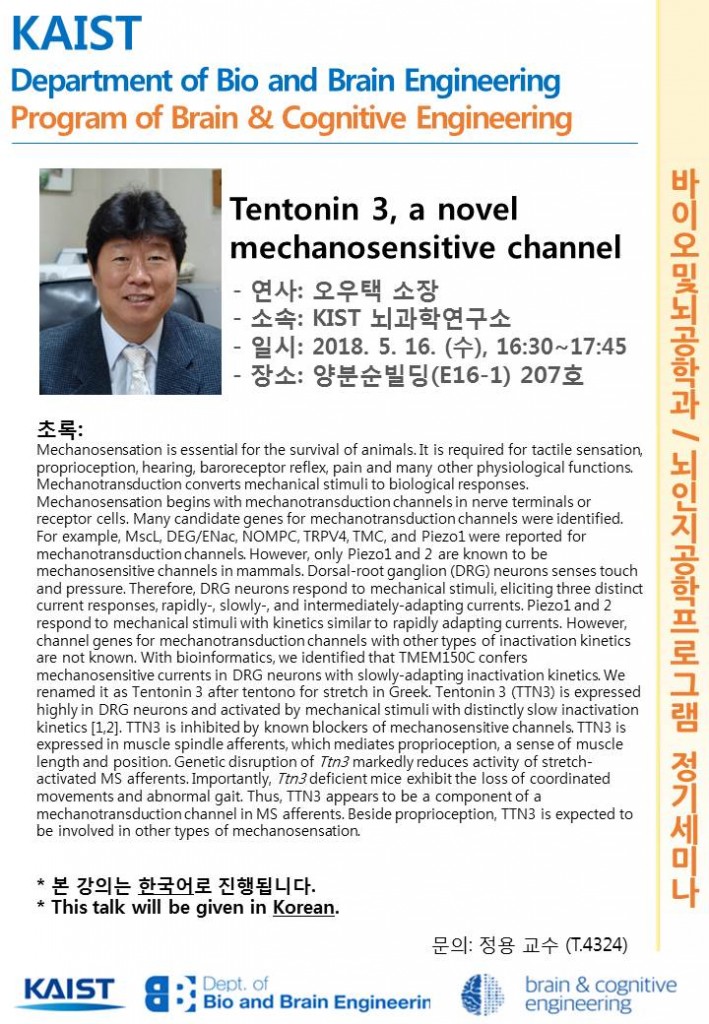| 연사 | Dr. Oh Uhtaek |
|---|---|
| 소속 | The Brain Science Institute, KIST |
| 일시 | 2018.05.16 PM4:30~5:45 |
| 장소 | E16-1 양분순빌딩.#207 |

A Department colloquium will be held on May 16th(Wed.)
1. Title : Tentonin 3, a novel mechanosensitive channel
2. Speaker : Dr. Oh Uhtaek, Director-general (The Brain Science Institute, KIST)
3. Date & Time : 16:30~17:45, May 16th(Wed.)
4. Venue : Rm#207, YBS Bldg(E16-1)___a.k.a Auditorium
Abstract
Mechanosensation is essential for the survival of animals. It is required for tactile sensation, proprioception, hearing, baroreceptor reflex, pain and many other physiological functions. Mechanotransduction converts mechanical stimuli to biological responses. Mechanosensation begins with mechanotransduction channels in nerve terminals or receptor cells. Many candidate genes for mechanotransduction channels were identified. For example, MscL, DEG/ENac, NOMPC, TRPV4, TMC, and Piezo1 were reported for mechanotransduction channels. However, only Piezo1 and 2 are known to be mechanosensitive channels in mammals. Dorsal-root ganglion (DRG) neurons senses touch and pressure. Therefore, DRG neurons respond to mechanical stimuli, eliciting three distinct current responses, rapidly-, slowly-, and intermediately-adapting currents. Piezo1 and 2 respond to mechanical stimuli with kinetics similar to rapidly adapting currents. However, channel genes formechanotransduction channels with other types of inactivation kinetics are not known. With bioinformatics, we identified that TMEM150C confers mechanosensitive currents in DRG neurons with slowly-adapting inactivation kinetics. We renamed it as Tentonin 3 after tentono for stretch in Greek. Tentonin 3 (TTN3) is expressed highly in DRG neurons and activated by mechanical stimuli with distinctly slow inactivation kinetics [1,2]. TTN3 is inhibited by known blockers of mechanosensitive channels. TTN3 is expressed in muscle spindle afferents, which mediates proprioception, a sense of muscle length and position. Genetic disruption of Ttn3 markedly reduces activity of stretch-activated MS afferents. Importantly, Ttn3 deficient mice exhibit the loss of coordinated movements and abnormal gait. Thus, TTN3 appears to be a component of a mechanotransduction channel in MS afferents. Beside proprioception, TTN3 is expected to be involved in other types of mechanosensation.
References
[1] Hong GS, Lee B, Wee J, Chun H, Kim H, Jung J, Cha JY, Riew TR, Kim GH, Kim IB, Oh U. Hong et al., Tentonin 3/TMEM150c confers distinct mechanosensitive currents in dorsal-root ganglion neurons with proprioceptive function. Neuron 91(1):107-118 (2016).
[2] Hong GS, Lee BJ, and Oh U. Evidence for mechanosensitive channel activity of Tentonin 3/TMEM150C. Neuron 94, 271–273 (2017).






